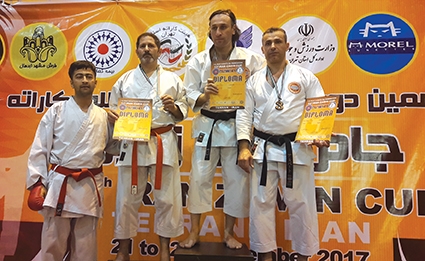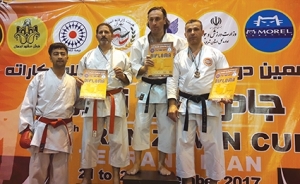Karate Champion on Georgian Success in the Field
Interview
Meet Chabuka Makharadze, who won the Gold Medal at the International Karate Cup held in Tehran, Iran, this December, adding another trophy to the many victories he had already gained. He holds a black belt, the 4th dan, and is a certified karate referee, instructor and examiner, with certificates assigned by the International Karate Federation. GEORGIA TODAY talked to Chabuka about his recent triumph, his passion for Karate, and his vibrant career to date.
Tell us about yourself. What started you off in Karate?
There was a Karate boom in Georgia in the 90s. At the time, it was quite new as a sport, and it felt very interesting. Back then, the strongest Karate team [in Georgia] was headed by Zurab Lejava, in the sports hall of the Tbilisi Ivane Javakhishvili State University first building. Lejava is the first Georgian Karate sportsman, and started practicing back in the 60s. My father took me to join and over time, my interest in Japanese martial arts grew to become my profession.
When did your professional career in Karate really kick off and which particular moments would you highlight?
I’ve been participating in tournaments since the age of 13, winning world and European championships, many prestigious competitions in different age categories, both at individual level and in and teams Kata and Kumite. For me, 1999 was very important, as that’s when the Georgian Youth Team in Karate won at the Shotokan Karate World Championship in Moscow, and our team became world champion for the first time in the history of Karate in Georgia. I was a member of that team, participating in the world championship competition for the first time, and I won the world champion title in team Kumite. Davit Jvania, Koba Tsertvadze and Giorgi Nadiradze were in our team, too. Then, in 2003, at the world championship held in London, I came third place in individual Kumite. In 2012, I won bronze at the European Championship in Turin, Italy, and a bronze medal in Kumite at the World Championship in Varna, Bulgaria, in 2013. I would certainly highlight the world championship held in Tokio in 2015, when in the Central Hall of the traditional Martial Arts of Tokyo, Budokan, I won a silver medal in individual Kata. The Georgian karate team also took part in that championship. In 2015, I won four medals at the European championship of Shotokan Karate in Kyiv, winning one gold in individual Kata in the adult category, a bronze medal in individual Kumite, and two bronze medals in team Kata. The same year, I came 2nd place in individual Kumite and 3rd place in Kata at the world Championship in Istanbul.
Tell us about your recent win in Tehran
It was an annual international championship held in Tehran, a major international karate competition bringing together some 1500 sportsmen from all around the world, organized by the Karate Federation. Our team, the Georgian Shotokan-Do Karate Federation, won two gold medals. I got gold in individual Kata, and Nodar Khachishvili won gold in individual Kata in the veteran’s category. I’ve been regularly participating in the international championships in Iran since 2008, and have medals in every individual category.
How popular is Karate today in Georgia? What is being done to promote it, and to what extent are you personally involved in promoting Karate?
There are karate clubs in almost every region of Georgia; there are many talented sports people participating in various championships and getting good results. It’s very important that karate was officially included in the program of the Olympic Games to be held in Tokyo, Japan; that alone will raise interest in karate as a sport, and will help to promote it. The Georgian Shotokan-Do Karate Federation has functioned since 2005 and we have many young, aspiring sports people training there, and generations of successful sports people who regularly participate at championships and bring significant results.
What do you do personally to develop yourself in the sport?
Apart from the sports achievements gained, it is important to work on raising your qualification and knowledge every year, so I attend many of the international training meetings and seminars, which are essential for professional development.
Nino Gugunishvili












